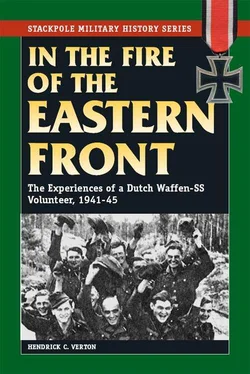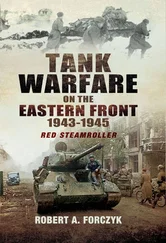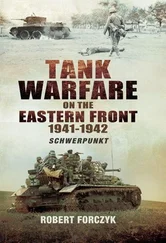Hendrick C. Verton
IN THE FIRE OF THE EASTERN FRONT
The Experiences of a Dutch Waffen-SS Volunteer, 1941-45
Translated by Hazel Toon-Thorn

Dedicated to my parents and my brothers and sisters, who because of my military service in Eastern Europe suffered a terrible penalty in Holland after the end of the Second World War.
Foreword
by Dr. Erich Mende

The author (centre) in 1985 with Dr Erich Mende (left) and a comrade.
[Dr. Erich Mende was a Member and Vice-Chancellor of Parliament from 1963 to 1966, and Chairman of the Liberal Party from 1960 to 1967.]
There is a Latin saying, “Vae victis!” i.e. woe to the vanquished, referring to the ‘Contempt of the Victor’, which Germany was made to feel at the end of World War II. It was confirmed once again, inasmuch that the German population stood under a collective guilt, for which every individual was penalised. The ‘victors’ released laws in all of the Allied occupied territories, for the annihilation of National Socialism and militarism, and with a total re-education programme. The Germans and their sympathisers had to learn from their mistakes and the error of their ways, and return to a liberal and lawful system of democracy.
A campaign of revenge also began against all those Europeans that had worked hand in glove with Germany, those who had lent a sympathetic ear. It lasted for years. Finally, with insight and common sense, politicians, unions, publishers, and the Church, led by Konrad Adenauer, Kurt Schumacher and Theodor Heuss, won the upper hand against false judgement and targeted insinuation, in order to achieve a balance of the truth.
It took over forty years to reveal to the rest of the world that Russia was responsible for the mass murder of thousands of imprisoned Polish officers and soldiers in Katyn. The Allies, as well as other European countries, despite knowing the truth, blamed the German Wehrmacht. This was done without any hint of a guilty conscience. More than half a million people suffered under the wrath of the ‘victors’ and their contemptible direction. Being either a close neighbour of Germany, or of the same moral code, many took up arms against Bolshevism, as ‘volunteers’ in Germany’s army. Their actions were regarded as treason, their sacrifices and sufferings in the theatre of war despised.
A Dutchman and his family describe how this really was, in all its shocking reality. European conduct, ideals and neighbourly friendship towards Germany, weave through the whole book, whether in East Prussia or in Silesia. In the defence of Breslau, Hendrik Verton reveals the brave conduct, ethical moral code, and sacrificial assistance given by the European ‘volunteers’. Only those who experienced the bitter German-Russian war can testify to the honest and conscientious truth of this book. I can recommend it to students of contemporary history, for its coherent collection of times, dates, and events.
It only remains for me to say that the author and his brother, whose large family stem from Holland, have greatly contributed to the rebuilding of German democracy, in the capital of Bonn, over the last forty years. In every way, my encounter with the Verton family was, at this time, a mutual acknowledgement for an expanded and peaceful Europe of ‘fatherlands’.
[Author’s Note: Dr. Erich Mende died on 6 May 1998. He had read my manuscript, which had been typed up to that point in time. Being very bitter over the defamation of Germany’s soldiers, he supported my work by offering and writing the Foreword to my book.]
If one day the world were to open its archives, which in this day and age remain partly inaccessible, we would be able to find out that in the recent past many things were different in reality than how they have been portrayed in the present day. For reasons of power, politics and education, the chroniclers and historians have written according to ‘political correctness’ that has been manipulated by the ‘victors’. Unfortunately, in ‘dancing to their tune’, historians have hidden the truth. They have therefore prevented any chances of reconciliation.
Nothing can be divided simply into light and shade, and I do not attempt to do this. However, I do wish, as an eyewitness, to anticipate the long awaited glasnost, and to give my account of my experiences of World War II.
My appeal to the reader is, to remember that these accounts of events, together with my feelings, can only be understood when viewed through the perspective of this period of time. Neither do I wish to justify events. My generation neither created nor was able to influence events of that time.
Of those living today, the majority did not live through the war, and even then only superficially. Some day mankind will learn about it only from ‘hearsay’. The results of such events however, do lead from that time into the present. I have reported some of these aspects quite extensively and others a little less. The last of the accounts deal especially with historic events, and therefore guilt and reconciliation play a role. The others utilise pressure groups, who from ‘time immemorial’ pursue a one-sided interest by using every discussion to uphold an old score.
Our family history began in the far distant past in France and Holland, and leaves a lot to speculation. Where, when and why they came, is not fully known. This family history, from the beginning of the 20th Century, is still very ‘young’, but for my part I have described it exactly, from the beginning of the 1930s. In its composition it includes the description of my own role, of course, and is seen through my eyes. Many had to ‘box’ their way through this very difficult time. Many lost everything they owned, had to build anew, and not lose their courage. Those born at that time had much to bear and experience. Those born now should be thankful that fate has produced a long peaceful development, and try to understand our role in history a little better.
Our destiny in life is simply a throw of the dice that brings luck for some, and trouble and torment for others.
Our capacity to remember grows ever fainter, therefore time is short. So here is my story, how I and my family experienced it.
Hendrik Verton
Early in 1982, 150 families all with the name of Verton, assembled together on the Dutch island of Schouwen—Duiveland. Nearly all came from Holland, except the contingent from Germany who had settled in Bad Godesberg in 1949, and were the only ones with this name in the whole of Germany. Where did they come from and how long had they been in existence?
Decades of research have revealed that the family’s roots are to be found in France. The town of Verton, with its population of just 1,200 people, has existed since ‘the beginning of time’. The Romans built Vertonu in the 1st century, 40 kilometres south of Boulogne-sur-Mer and on the Channel coast. Today, due to sedimentation from more than one river, Verton now lies 6 kilometres distant from the sea. The astonishing fact is that in the whole of France there are no other families to be found with the name of Verton. So how did the Vertons come to settle in Holland?
Читать дальше















